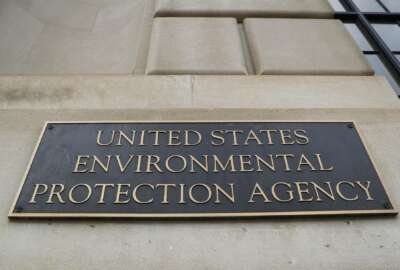
Former EPA leaders want Congress to help restore federal scientific workforce
In today's Federal Newscast, former administrators from the Environmental Protection Agency are encouraging Congress to help EPA rebuild its cadre of scientific...
To listen to the Federal Newscast on your phone or mobile device, subscribe in PodcastOne or Apple Podcasts. The best listening experience on desktop can be found using Chrome, Firefox or Safari.
- Former administrators from the Environmental Protection Agency are encouraging Congress to help EPA rebuild its cadre of scientific talent. They said they’ve observed dwindling employee morale in recent years and said political appointees have often sidelined the expertise of career employees. Former EPA administrators told the House Energy and Commerce Committee, Congress could set specific guidelines into law that might better manage transparency and integrity standards at all scientific agencies throughout any administration.
- Contractors impacted by the pandemic received a bit of a reprieve under the American Rescue Plan. The House passed the Senate version of the bill that extends the 3610 provisions through September 30. The authority that lets agencies pay vendors who couldn’t perform on a contract due to COVID-19 restrictions was set to expire at the end of March. This is the fourth extension of the 3610 provision since Congress created it last summer. (Federal News Network)
- The American Rescue Plan includes a few more benefits for federal employees. Federal employees will soon have access to up to 15 weeks of paid leave. They can use this new type of leave to quarantine, recover from COVID-19 or care for sick family members or children who are learning from home during the pandemic. There’s a $1,400 cap on the amount of leave employees can take during any given week. President Biden is expected to sign the COVID-19 relief package tomorrow. (Federal News Network)
- A bill looking to make agency rulemaking more transparent comes into focus. Sen. James Lankford (R-Okla.) and Congressman James Comer (R-Ky.) introduced the Guidance Out Of Darkness, or GOOD Act. The bill would require agencies to public their regulatory guidance online in a single accessible location. This marks the third bill Lankford has introduced in this session of Congress focused on reforming the agency rulemaking process.
- So far, agencies have survived the latest cybersecurity incident. The Cybersecurity and Infrastructure Security Agency says the vast majority of agencies have met the requirements of the emergency directive it issued last week after critical vulnerabilities were found in on-premise Microsoft email servers. Eric Goldstein is the Executive Assistant Director for Cybersecurity at CISA: “We are working with individual agencies to assess the results of their forensic analysis. At this point in time, there are no civilian federal agencies that are confirmed to be compromised by this campaign.” Goldstein said this is an evolving incident and CISA expects more information to continue to come in. (Federal News Network)
- Defense agencies have many technologies to boost warfighter readiness but they always need to keep a defensive cybersecurity posture, and stay one-step ahead of adversaries. Agencies like the Defense Logistics Agency and the Defense Advanced Research Projects Agency want to find more uses for artificial intelligence and automation. DoD tech leaders said that takes technology with common sense reasoning capabilities, and smart use of resources. (Federal News Network)
- Defense Secretary Lloyd Austin already said climate change is a top security threat. Now he’s having the Defense Department take a hard look at the situation. The Pentagon’s chief established a working group of Defense officials to look into how rising sea levels and extreme weather will affect the military. Austin said the new group will track how the Defense Department responds to climate and energy directives set by the White House and will follow how climate and energy related actions work with future goals. Austin said DoD will incorporate climate change risk analysis in planning for bases and in strategy, wargaming and other decision making.
- The House Armed Services Committee’s newest task force will recommend legislative actions to strengthen the defense supply change for the 2022 defense authorization bill. Elissa Slotkin, co-chairwoman of the Critical Defense Supply Chain Task Force, says the group is not afraid to make recommendations that could cost money in an austere budget environment. She says the Defense Department and Congress need to make hard decisions on outdated systems to ensure the United States has the materials it needs for future crises. (Federal News Network)
- Think slow and act fast — that’s the mantra the Department of Veterans Affairs is using when it comes to deploying 5G technology. VA’s Center for Innovation wants a deliberate, human-centric design to integrate 5G in service delivery. The Center’s Diffusion Lead, Ryan Vega, teased some developments with 5G at VA’s medical centers in central Florida which will happen over the next couple of months. (Federal News Network)
- A year into the COVID-19 pandemic, the Government Accountability Office still faces a higher demand for its oversight work. GAO expects to take on as many as 200 COVID-19-related projects over the next five years, and is asking for an $83 million increase in its budget to keep up with demand. That money would help the agency make 220 new full-time hires, and help staff up its new Science, Technology Assessment, and Analytics team. For every dollar invested in GAO, the agency has identified more than $100 in savings. (Federal News Network)
- Federal employees in the Washington, D.C. metro area donated over $37 million through the Combined Federal Campaign in 2020. That’s more than employees donated in 2018 and 2019. And it’s well above the CFC’s goal for 2020. The campaign hoped the region could raise at least $30 million last year. Federal employees also donated 48,000 hours of volunteer time to charities in the campaign. At least a quarter of donors were first-time givers to the Combined Federal Campaign in 2020.
Copyright © 2025 Federal News Network. All rights reserved. This website is not intended for users located within the European Economic Area.
Eric White
Eric White is news anchor and Federal Drive producer at Federal News Network.
Follow @FEDERALNEWSCAST





